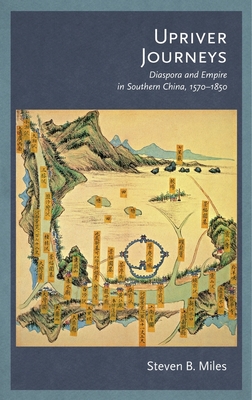

 Harvard University Press
Harvard University Press
Upriver Journeys: Diaspora and Empire in Southern China, 1570-1850


Key Metrics
- Steven B Miles
- Harvard University Press
- Hardcover
- 9780674975200
- 9.2 X 6.3 X 1.1 inches
- 1.3 pounds
- History > Asia - China
- English
 Secure Transaction
Secure TransactionBook Description
Tracing journeys of Cantonese migrants along the West River and its tributaries, this book describes the circulation of people through one of the world's great river systems between the late sixteenth and mid-nineteenth centuries. Steven B. Miles examines the relationship between diaspora and empire in an upriver frontier, and the role of migration in sustaining families and lineages in the homeland of what would become a global diaspora. Based on archival research and multisite fieldwork, this innovative history of mobility explores a set of diasporic practices ranging from the manipulation of household registration requirements to the maintenance of split families.
Many of the institutions and practices that facilitated overseas migration were not adaptations of tradition to transnational modernity; rather, they emerged in the early modern era within the context of riverine migration. Likewise, the extension and consolidation of empire required not only unidirectional frontier settlement and sedentarization of indigenous populations. It was also responsible for the regular circulation between homeland and frontier of people who drove imperial expansion--even while turning imperial aims toward their own purposes of socioeconomic advancement.
Author Bio
A common theme in Steven Miles' research projects has been the physical movement of people across space, from the early nineteenth-century literatus Xie Lansheng’s peregrinations in urban Guangzhou to Cantonese merchants trading on the Guangxi-Vietnam border, to global Chinese migration.
Miles' first book, The Sea of Learning (2006), explores the in-migrating, socially ascendant, urban elite in the southern Chinese city of Guangzhou (Canton) who embraced new trends in literature and scholarship promoted at the city’s fashionable academy, the Xuehaitang.
His second book, Upriver Journeys: Diaspora and Empire in Southern China, 1570-1850, traces a range of “diasporic” activities – from serving as officials, to acquiring land and registering as students in upriver schools in order to sit for less competitive civil service examinations there, to conducting trade, to obtaining wives or concubines, to touring – that Cantonese men pursued upstream along the West River basin. A recently completed monograph, Opportunity in Crisis, explores the history of migration during the breakdown of the Qing order in southern China in the mid-nineteenth century and the reconsolidation of Qing control in the late-nineteenth century. Set in Guangxi, it tells the little-known story of the mid-century wars between Triads and river pirates, on one hand, and Qing loyalists and carpetbaggers, on the other.
Both of these books are supported by "Cantonese Migrant Networks", a database of epigraphical materials from the West River basin.
Chinese Diasporas: A Social History of Global Migration, forthcoming from Cambridge University Press, is a general history of internal and external Chinese migration from the sixteenth century to the present day.
For his next project, Miles plans to return to urban history while retaining his interest in the movement of the people across space. Under the theme of "seasonality and cities", he will explore the rhythm of urban life in nineteenth-century China, the many interconnected ways in which political, economic, leisure, and ritual activities were patterned according to seasons.
Source: Washington University St Louise Arts & Sciences
Videos
No Videos
Community reviews
Write a ReviewNo Community reviews